Coming Home: The Story of John Njoroge and Valley Light Home
- John Njoroge
- May 5, 2020
- 12 min read
Like a young David who used five stones to defeat his enemy, 20-year-old John Njoroge felt God urge him to “use what he had in his heart” to make a difference. Indeed, it was the poverty and suffering that marked his own childhood in Kenya which prepared his heart for the hungry and orphaned children of Valley Light Home.
The baby cried all through the night. The noise pierced John Njoroge’s head as he slept in the slums and he wished its mother would soothe it. When he woke up the next morning, he found out the baby had been left in the street all through the night and had cried until it died. A passerby dug a small grave to bury the child in, performed the symbol of the cross, and went on his way.
John hadn’t wanted to come. A missionary had asked the then 19-year-old Njoroge to help her teach, feed, and rescue the kids on the streets. He took a month to decide until he finally gave in.
“I remember exactly how it happened,” John says. “I wrote a long letter to her explaining why I couldn’t do it. I said things like ‘I have no training as a teacher,’ ‘I just finished high school,’ and ‘I’m trying to figure out what to do next,’ and ‘I don’t have the money to do it.’ I actually wrote the letter as I was doing my devotion that morning. I happened to be reading about David. David was picking out five stones and for some strange reason, I immediately saw myself in David, in what God was asking me to do. It was like God was saying to me, ‘Use what you have. Use what’s in your heart.”
John tore up the letter and spent that year in the slums. For the first fourteen days he couldn’t pray. The baby’s death outside his room, coupled with the intense poverty and suffering surrounding him, quenched any desire to pray and it wasn’t until his birthday, fourteen days later, that the tension cracked and he quietly thanked God for another year of life.
“One of the saddest things we’d see is a huge garbage heap there, and these kids would dig into it,” John says. “It was a big one. The stench coming from there was incredible. The kids would dig in there, get whatever they could find that was edible, then they would light a fire. Several kids held up a large plastic bag over the fire as it started to rain, while others kept the fire going so they could warm that food to eat it.”
Although John came face-to-face with children who were hungry and orphaned in the slums, poverty and suffering marked his own childhood. As a small child his father turned from a kind figure to a frightening one, and John bore the brunt of his father’s beatings.
John first remembers realizing things were bad at home when he was five years old. His mother had shielded him and his siblings from their father’s drunkenness and infidelity, but couldn’t hide the problems from them any more. His mother split up the children, moving him and one of his sisters to his grandmother’s house.
“I clearly remember saying that I did not want to go, and I also remember being carried on my grandmother’s back to the bus station and eventually to her house, crying all the way,” John says. “My sister and I stayed with our grandparents for what seemed to me like an eternity. I intensely missed my other siblings and my parents. Almost the whole time I was there, I vividly remember waking up many nights after a haunting, recurring dream that my parents and my other siblings had died.”
After a couple of years, the family was reunited again.
One night, John’s friend told him his mother had left town. John ran home to find his siblings home alone, their eyes full of tears.
“I ran back outside crying. My mom had no shoes, and I had become pretty good at identifying her footprints on the soft dirt, since, apart from the main two-lane highway that cut across town, none of the roads were paved. I followed my mom’s footprints to the place a few miles away from town where she had boarded the bus,” John said. “She had probably walked several miles away from our town to avoid being seen by my father as she took off from home. I sat at the bus stop and almost cried myself to sleep.”
Instead, he went back home. His mother stayed away for a few months. His father came in late and left early every day and John and his siblings hardly saw him.
“There was no food in the house, and my oldest sister supported us by helping a neighbor sell some illegal, locally brewed beer. That marked the end of my two older sisters’ education. We were all kicked out of school for lack of school fees and uniforms, for which I was grateful after all the ridicule and insults I got from other students and even from some of my teachers,” John says.
His mother returned, crying when she saw the state of her children. She met with the local chief and elders to decide what was to be done. It was decided that the children named after the father’s side of the family would be left with the father: John and his oldest sister. One of the elders brought John and his sister back to his father’s house, but when they found that the locks had already been changed they waited outside for their father’s return.
“When my father showed up, the elder walked up to him and explained the situation. As if to shield us from the impact of what was about to happen, the man stepped between our father and us. But this did not keep us from overhearing my dad say, ‘I don’t want them. Take them back where you got them.’ That was the last time I ever saw my dad, and those are the last words I heard from him. He never made the effort to look for us. He died in February 1991.”
John’s mother later told him she knew his father would refuse to take them, and she would never have left without all of her children. So John, his three siblings, and pregnant mother moved to Maai Mahiu, a thriving farming community at the time.
Just a few months later she gave birth to her fifth child. She had no job and no means of providing for her family. Some farmers let them stay in temporary, one room, grass-thatched mud huts built on the farms. Whenever farm workers needed to use the hut they were staying in, the family had to move to another one. Sometimes they slept outside, homeless nomads, but John says it was a relief to be distant from his father’s abuse.
In the very first shack they stayed in, they woke up to a large puff adder–a deadly snake–lying next to John’s older sisters asleep on the dirt floor.
Everyone ran screaming out of the shack and watched the venomous snake slither behind one of the three stones that made up the fireplace.
“My mom would not let me go back inside and kill it. We called a neighbor. He looked inside, saw the snake and ran out of the house. We looked in later, and the snake was gone. We knew it was still close by,” John said. “It was never killed, and we had to sleep in the same shack that night. By God’s grace, nobody was bitten by either that highly poisonous reptile or by the several others we killed in the other huts.”
After a few years, a famine in Kenya forced the family to move to Kijabe. His mother found work as a housemaid and enrolled her children back in school.
“My mother never let us feel sorry for ourselves, and she made us believe that we could do what any of the other kids were doing, even if we had to study at home, on our own,” he says. “She made sure we knew what other kids were studying, and she forced us to keep up with them in spite of the circumstances.”
John preaching in Kenya.
John did well in school, and it was there that he first read the Bible. One night a schoolfellow brought him to a church. The pastor told them who Jesus was and explained the gospel, and John says he became a Christian that night. A missionary who taught Bible classes at the school gave all the kids their own Bibles, and John remembers holding it in his hands.
“I started reading it from Genesis chapter one, and read all the way to 2 Samuel in just a couple of months. For some reason, I was captivated by the story of David and his interaction with God. I remember reading 1 and 2 Samuel several times and telling some of these stories to my family,” he says.
At a particularly desperate time in John’s life, with no food for his siblings and his mother keeling over with pain and in need of a hospital, he knocked on a missionary couple’s door. The wife, Judy Entwistle, answered the door, wiped John’s streaming tears and nose, and calmed him with conversation and cookies until he was able to tell her he needed help. Judy sprang into action and she and her husband, Roy, helped sustain the family while John’s mother recovered.
It was the Entwistles who gave John and his family their first Christmas presents and who helped build a house with electricity. Roy gave John books to read and mentored him through school, and John did so well he got a scholarship to study medicine at St. Lawrence University. He couldn’t eat for three days in his excitement to go to America.
However, Roy reminded John of a vow he had made to serve God in ministry.
“Some of my teachers had publicly expressed the view that those who end up becoming pastors or Christian workers did so because they could not succeed in anything else in life. They were failures in life, even in their capacity as Christian workers. This was supposed to be part of our motivation to do well in school: to avoid being stuck in Christian work! I had told God that I would prove this theory wrong with my life if He ever made me successful in the eyes of the world,” John says. “If God would one day make it possible for me to prove to my high school teachers that I was qualified to ‘succeed’ in life, I would go into the ministry to prove to them that serving God was all worth it.”
“I started reading it from Genesis chapter one, and read all the way to 2 Samuel in just a couple of months. For some reason, I was captivated by the story of David and his interaction with God. I remember reading 1 and 2 Samuel several times and telling some of these stories to my family.”
The course of John’s life changed when he decided to attend Philadelphia College of Bible, now Cairn University, in Pennsylvania. He said he’d try it for one year before heading to St. Lawrence.
“I knew there was nothing wrong with either decision, but not only had I made a promise to God that I would go into fulltime ministry if He ever made me successful in life, I also felt quite compelled to tell others about Him,” he says.
He had preached several times while working in the slums for a year and enjoyed it, but wasn’t sure in what direction he should go.
“I had seen God use me to bring others into his kingdom. At the same time, I felt somewhat disillusioned about the idea of repeating the storyline of salvation to folks who, I felt, already knew it,” he says. “Most nonbelievers that I had met, even in Kenya, had heard the story of salvation. What would make my repeating it so special?”
John decided to stay at Cairn and finish his training there. Afterward, he went to Talbot School of Theology where he earned a master’s degree in philosophy, a master’s degree in New Testament studies, and a master of theology. All his sisters and brothers are now believers. His grandmother, who carried John on her back many years ago, became a Christian, as well, after John told her about Jesus.
“If God would one day make it possible for me to prove to my high school teachers that I was qualified to ‘succeed’ in life, I would go into the ministry to prove to them that serving God was all worth it.”
Today, John is a member of the speaking team at Ravi Zacharias International Ministries. He speaks frequently on university campuses, churches, and conferences around the world and hosts the African versions of RZIM’s radio programs Let My People Think and Just Thinking, which are heard in several countries across the African continent
John met his wife, Leah, at Cairn. The very first day they met in 1996, Leah told John that her dream was to run an orphanage in Kenya, and a year later, when John asked Leah to marry him, he told her of his strong desire to serve God. A few years after their marriage, their dreams would align.
Valley Light provides an opportunity for their children to go to school, an opportunity that might not have existed otherwise.
Valley Light Home
During college in Pennsylvania, Leah stayed with a couple to whom she briefly mentioned her dream of starting an orphanage. Five years ago, the couple called John and Leah and told them they had raised $100,000 to get them started.
Valley Light Home, nestled against the wall of the Rift Valley in Maai Mahiu, opened its doors to take in six children in August 2009. The youngest little one to arrive was only a few days old, and they now have 27 children.
“Leah basically runs it,” John says. “She’s on the phone every day, looking at all the records and making sure we’re complying with all the requirements.”
When asked how the orphanage is run, John responds, “It’s everything. The kids stay there, go to local schools, and do anything as they would do in any family. We try to run it like a home as much as possible. So they have chores and responsibilities, especially the older ones.”
In the evenings they’ll do homework and take turns shining all their school shoes.
Everyone eats together at a big table–usually cornmeal cakes with beef or chicken stew, a side of collard greens from their garden, and plenty of Mandazi (a fluffy Kenyan pastry)–and every night the older children lead a Bible study.
One of the older boys, Francis, loves to preach in the evenings. The children will gather in their pajamas and listen to him as he reads a passage from the Bible.
When the sun rises, so do they and they leave for school as a group, their shoes caked with black polish from the previous night’s shine.
“They live typical kids’ lives, which is fascinating considering their backgrounds,” a visitor said.
The Children
The children love visitors. Eight-year-old Sylvia is known as the nurturing one, and wants to know where the guest will stay so she can clean the room and make it look nice. Another child, David, is curious. He’ll take apart cameras, cell phones, and anything he can get his hands on, just to know how things work.
John describes the children with a hint of pride in his voice, especially when showing before and after photos of the kids.
“This was Mary when she first came to us,” he says, pausing on a photo of the little girl’s face. Her cheeks are sunken, her eyes and skin are dull with malnourishment, and her mouth is drawn tightly over her teeth.
John clicks over to the next picture and says, “Now look, after.”
The difference in the little girl brings a wide smile to John’s face. Her skin is a warm brown and brilliant, her eyes are bright, and she’s grinning into the camera. The change happened within five months of her coming to Valley Light.
Baby John was just a few days old when he came. His mother kept forgetting about him and leaving him outside until someone brought him to Valley Light.
“Many children in Kenya are left to roam the streets,” John says. “Even if the parents are there, some of them are on drugs, some are alcoholics, some just don’t care.”
Other families are simply too
impoverished to care for their children.
There are so many children in need that choosing can be difficult, and for every one child Valley Light can take, four or five are turned away. Valley Light hired a social worker to look through all the cases that come through, and John says she has the difficult job of choosing only the worst cases. The children at Valley Light have no one and nowhere to go.
A number of the children at Valley Light were abandoned on the streets or left in hospitals after their birth.
For many of the younger children, no one knows where they came from or who they are.
They come to Valley Light weak from hunger and frightened. When Valley Light’s doors first opened, John asked each child what gift he could bring back for them from America. Every child asked for food.
When he asked them the same question five months later – after months of care – the children asked for games and toys.
“Their personalities begin to come out as they have been there for awhile,” John says.
The Future
John and Leah will be returning permanently to Nairobi soon to live near Valley Light, as it will be easier to handle the many tasks that come with raising 27 children.
John says Kenya is also on the precipice of change in the world of ministry.
“There may be more apologists within RZIM than there are in all of Africa. So there’s a lot of work to do,” John says, gesturing eagerly. “This is the right time to be moving back, because Kenyans are becoming aware of what’s going on around the world, the world of ideas. We are now engaged in the battle for the mind, modernism, post-modernism, existentialism, and more.”
Kenya is also home.
“I love going back. Anytime I get off on a plane somewhere I almost always wish I was in Nairobi,” John says.
From the smallest child to the oldest, Valley Light is home. The kids know John and Leah and look forward to their coming. While Leah helps the staff members cook for the children, John will go outside and push two or three children at a time on the swings. It becomes more and more difficult for John and Leah to leave.
“You want to bring all of them home with you,” John says, wistfully looking at more photos of the children dancing and laughing in the corridors of the home. “It’s my wife’s Disney World. It’s her happiest place on earth. It was her dream and her vision, but now I can see myself doing just that and nothing else. It’s one thing to see a statistic, of orphans in Kenya and all that; it’s another thing to know them. ‘This is Edith, and this is so-and-so,’ to know them by name. It’s a very different story.”
John with his wife, Leah, and their two boys, Jonathan and Benjamin.
Article previously published on the rzim.org website.




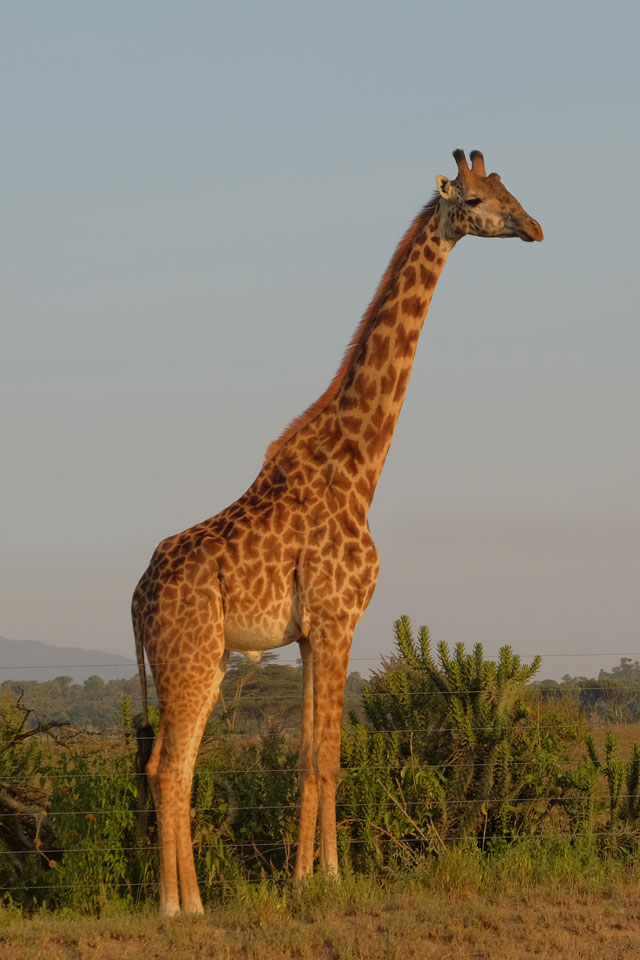

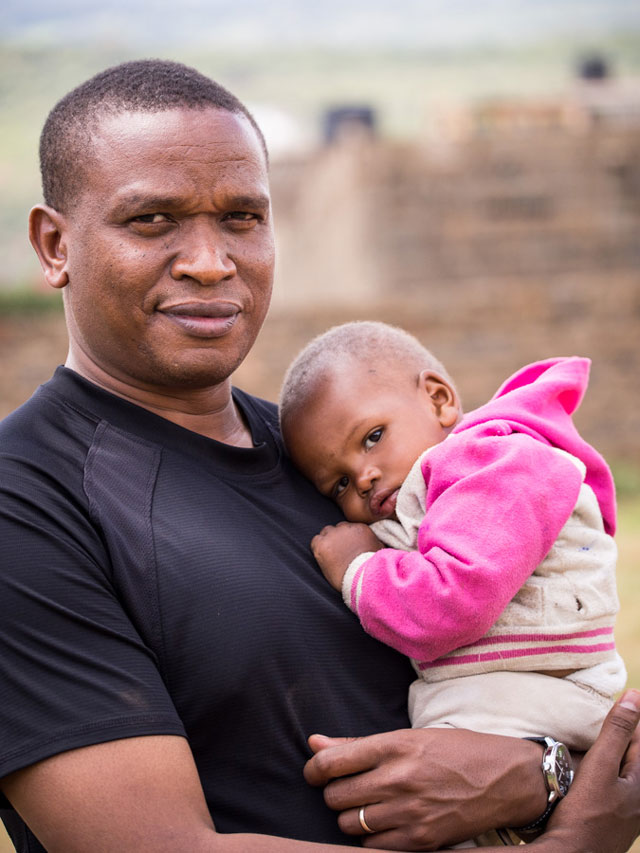



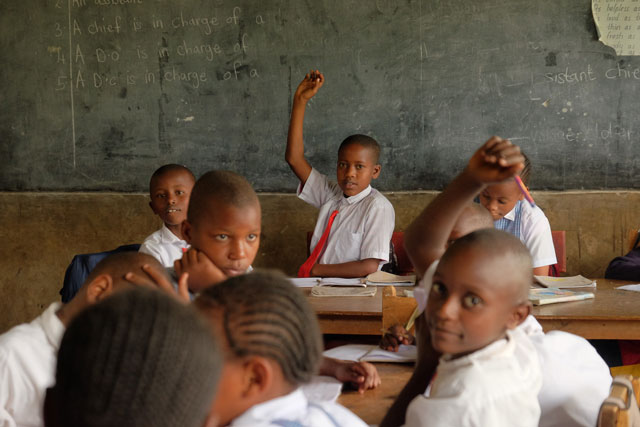

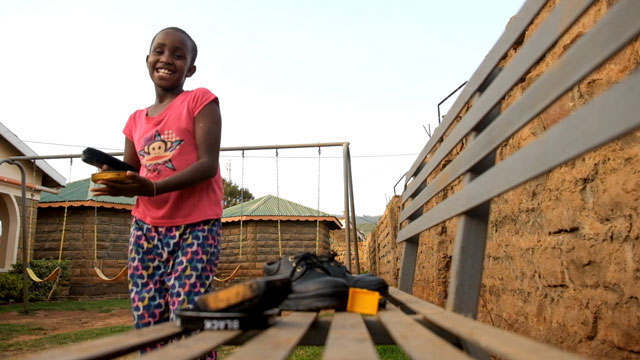



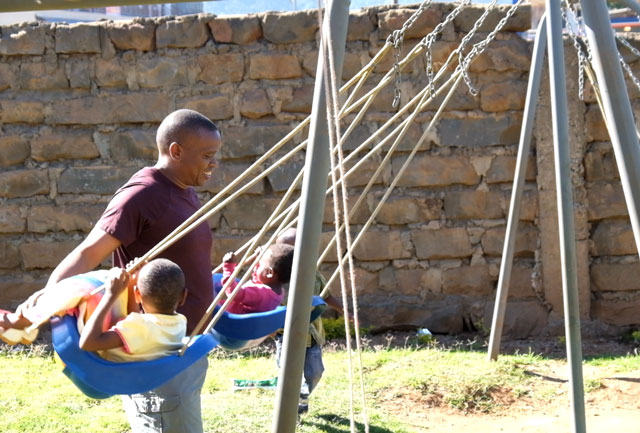

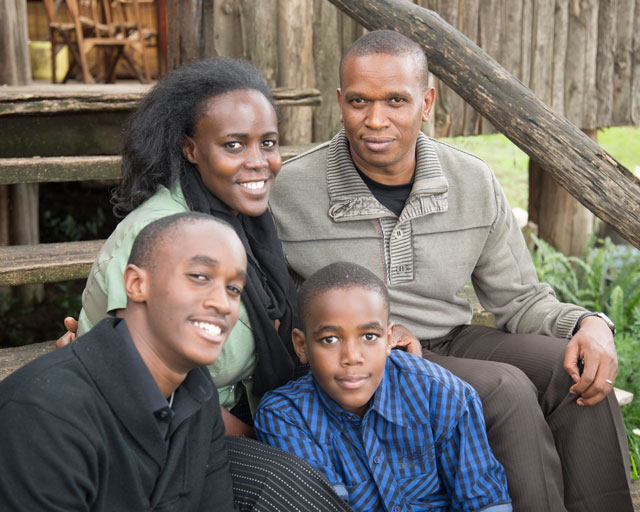
Comments